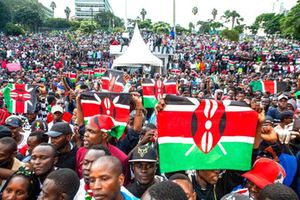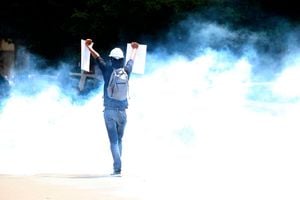Premium
Inside Kenya's plan to reclaim steeplechase throne
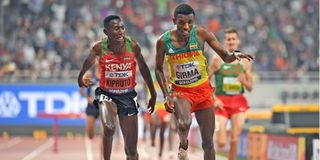
Kenya's Conseslus Kipruto (left) crosses the finsh line and wins next to second-placed Ethiopia's Lamecha Girma in the Men's 3000m Steeplechase final at the 2019 World Athletics Championships at the Khalifa International stadium in Doha on October 4, 2019.
What you need to know:
- Despite Kenya putting their hopes on fresh blood, there was no reprieve at this year's World Championship in Budapest, Hungary as Abraham Kibiwott settled for bronze behind the usual suspects El Bakkali (gold) and Girma (silver)
- Amos Biwott, who began Kenya's winning streak in the steeplechase after bagging gold at the 1968 Olympic Games in Tokyo, feels there is need to put more effort in training and get out of the comfort zone
- The legendary Kipchoge Keino, who represented the country in the 60s and 70s, believes that the sport has changed and athletes need better sporting facilities and good training
Kenya has built a reputation in the field of long-distance running for decades, particularly in events like the 3,000m steeplechase.
Kenyan athletes have dominated this event in major competitions, including the Olympic Games, World Championships, and other international meets such as the Diamond League.
However, in recent years, what used to be a preserve for Kenya has slowly escaped our grip with other countries catching up.
The Tokyo 2020 Olympic Games marked a significant moment in the history of Kenyan athletics, as for the first time since 1968, Kenya did not win gold in the 3,000m steeplechase event with the best ranked Kenyan, Benjamin Kigen settling for bronze behind winner Soufiane El Bakkali of Morocco and Ethiopia’s Lamecha Girma.

Morocco's Soufiane El Bakkali celebrates winning the men's 3000m steeplechase final during the World Athletics Championships at the National Athletics Centre in Budapest on August 22, 2023.
Another disappointment awaited Kenyans at the 2022 World Championships in Oregon, USA after the pre-race favourite Conseslus Kipruto settled for a bronze medal with El Bakkali and Girma bagging gold and silver respectively.
Despite Kenya putting their hopes on fresh blood, there was no reprieve at this year's World Championship in Budapest, Hungary as Abraham Kibiwott settled for bronze behind the usual suspects El Bakkali (gold) and Girma (silver).
Several factors have contributed to this shift and one key aspect is the growing competitiveness in global athletics with the countries that were historically not dominant in long-distance running having invested heavily in athletics programs, scientific training methods, coaching, and infrastructure to develop top-tier athletes.
Additionally, changes in training techniques, technology, access to resources, and increased professionalism in athletics worldwide might have contributed to a more level playing field, making it harder for any country or region to maintain absolute dominance in specific events.
Despite this shift, Kenya still possesses a strong pool of talented athletes and continues to perform well in various track and field events. The competitive landscape has become more diverse, but Kenya remains a force to reckon with in the world of athletics.
Nation Sport reached out to previous world beaters and coaches to find out what the current crop of athletes need to do to reclaim lost glory in steeplechase race.
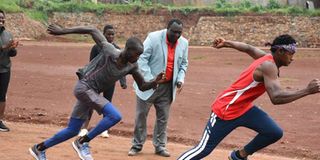
Boniface Tiren (centre), an athletics coach, trains Zablon Ekwam (left), and Boniface Ndura, upcoming sprinters, at Ndura Sports Complex in Kitale, Trans Nzoia County which is under construction on June 18, 2020.
Veteran coach and a retired teacher Boniface Tiren has been training athletes since 1985, specialising in the 3,000m steeplechase race. He insists that there is need to change tack for the country to get back to the top.
“We need to stop complaining, go back to our roots and change tactics because that is the only way to the top. The crop of athletes we have right now is strong and I believe Kenya will once again be on top. It’s not too late,” said Tiren.
He added that proper structures have to be put in place because there is a gap between the retired athletes and the elite athletes who are currently competing in the world events.
“There is also need to start identifying the athletes at the grassroots and nurture them all the way to the national events to ensure continuity in the event. The athletes should be put in a camp to shape them and prepare them for international events.
“National Olympic Committee of Kenya (NOC-K) should come in and fund the federation (Athletics Kenya) in collaboration with Ministry of Sports and make sure athletes start early preparations ahead of the Olympic Games in Paris,” advised Tiren.
Amos Biwott, who began Kenya's winning streak in the steeplechase after bagging gold at the 1968 Olympic Games in Tokyo, feels there is need to put more effort in training and get out of the comfort zone.
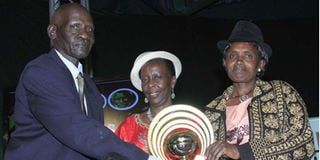
Rwanda's Minister for Foreign Affairs and Cooperation Louise Mushikiwabo (centre), Amos Biwott (left) and his wife pose for photos with the heroes’ award that Amos won on December 11, 2014 during Nation Media Gala held at Safari Park Hotel. Biwott was the first Kenyan to win the 3,000m steeplechase gold in 1968 Olympic Games in Mexico.
Biwott started his career in 1966 as a 5,000m and 10,000m athlete but switched to steeplechase in 1968.
“We started with heats and went all the way to finals and were selected to represent Kenya in the Olympic Games. That is where I managed to win a gold medal ahead of my compatriot, the late Benjamin Kogo who bagged a silver medal.
“That was the start of Kenya’s haul for the gold medal but it is sad that we are now losing our tradition which has been there for many years. The athletics officials should get to the bottom of this and rectify so that we can have our athletes back on the podium,” said Biwott.
The legendary Kipchoge Keino, who represented the country in the 60s and 70s, believes that the sport has changed and athletes need better sporting facilities and good training.
“In steeplechase, we need proper training. They have to prepare in a high altitude region like Nyahururu, a place I personally trained because it gives an athlete an advantage of performing better. Coaches here come in handy and they have to train the athletes well so that they can be able to handle pressure from other competitors,” said Kipchoge.
“I'm worried that we are almost missing a podium position and there is need to sit down and have a discussion on how we shall get back our glory. As we head to the Olympics in Paris, we have to know who are the coaches handling the athletes before the Games because they have to work on a different tactic for Kenya to win again,” said Kipchoge.
Keino also stressed the need for coaches to stick to their specialty and research on new training methods so that they can be at par with the rest of the world.
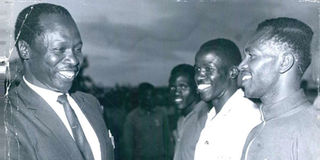
Daniel arap Moi (left), then Kenya’s Vice-President, congratulates Kipchoge Keino for making the Kenyan team to the 1968 Mexico Olympic Games. Next to Keino are other team members Wilson Kiprugut and Robert Ouko.
Former world 3,000m steeplechase record holder Moses Kiptanui, who is now a business man after retiring from the military and athletics, has been watching from afar how things have been unfolding in a race he had mastered.
Kiptanui started his career by competing in 1,500m before he discovered his prowess in steeplechase events and eventually won gold at the 1991 World Championships.
Kiptanui said that he used to compete in various races from 1,500m, 3,000m indoor, 3,000m steeplechase and 5,000m races which enabled him to perform better in his specialty.
“During our days, the tactics I used was to compete in short races to gain speed and long races for endurance. That is how I managed to break seven records during my career but that is all gone now.
“Steeplechase is a combination of strength and speed and if you add discipline definitely there will be good results. A lot has changed and Kenya should just wake up and be at par with the world because we feel we have been left behind,” said Kiptanui who didn’t have a coach during his active years.
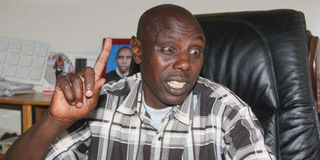
Former three-time World steeplechase champion Moses Kiptanui addresses the Press at his office in Eldoret on November 10, 2015. PHOTO | JARED NYATAYA |
He added that the pathetic conditions of sports facilities has also contributed to the poor performance and there is need to seriously work on that because it is getting harder to get a podium finish compared to yesteryears.
“For the Olympic Games, we should have started planning three years ago because we are already late. When we perform poorly, we start making excuses but it is not too late to invest as a country and make sure we get back to the top and bring back glory,” he added.
Kiptanui said that he used to give a helping hand as a steeplechase coach without pay because he loves his country but has since stopped. His advice is that all federations must change their way of doing things and not Athletics Kenya alone.
The 2004 Olympics bronze medalist Paul Kipsiele also featured in the event battling it out with bigwigs such as Ezekiel Kemboi, Brimin Kipruto and Richard Matelong at his peak. He started his career with the 10,000m race before switching to steeplechase.
Multiple world champion and two time-time Olympic champion Ezekiel Kemboi noted that since his generation retired, Kenya’s performance has dipped significantly.

Two-time World 3,000m Steeplechase champion Conseslus Kipruto (left), and former two-time Olympic 3,000m Steeplechase champion and four-time World 3,000m Steeplechase Champion Ezekiel Kemboi, during Kipruto’s engagement ceremony with his fiancée Jacqueline Jeptoo, at her parents’ home in Kapngetich, Nandi County on December 15, 2023.
He says their successors are not up to task because during their era, they used to plan on how they will execute any upcoming international events hence the podium sweeps.
“The current athletes have been competing in many races before the World Championships or the Olympic Games compared to our days. I could only compete in three races and wait for the big assignment where we used to run as Team Kenya but that is what is lacking in our athletes nowadays,” said Kemboi.
He said the current generation needs to compete in fewer races in the run-up to major championships and spend more time in training to get the right technique.
“In my own observation, it will take Kenya like five years to redeem ourselves and get back on the podium because the two top athletes from Ethiopia and Morocco are in their own class. Of course they have been working hard to beat Kenyans and they have finally done it because we relaxed a little bit,” added Kemboi.
He advises that those selected to represent Kenya should always run for the country and not the management camps that they come from.
“I have been talking to the top leadership in athletics on spending weekends with the steeplechase athletes and the need to plan early because we shall have the same (dismal) results when we head to Paris,” he said.
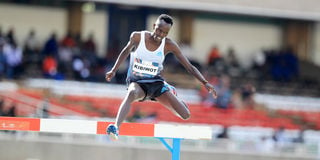
Abraham Kibiwott clears a hurdle in the men's 3,000m steeplechase race during the Kip Keino Classic at Moi International Sports Centre, Kasarani on May 7, 2022.
The 3,000m steeplechase world bronze medalist Abraham Kibiwott, has competed at a high level against notable rivals such as Ethiopians Getnet Wale, Girma and El Bakkali. He pointed out that competition has become stiffer in recent years.
“It has been a tough year but achieving a bronze medal for me was good. There is need to work harder because the game has changed, it’s getting tougher each year. I think a change of tactics will save us and get us back to the top,” said Kibiwott.
The 2018 World Under-20 3,000m silver medalist Leonard Bett is also of the idea that more training on tactics and speed should be done once the final team for any global event has been selected.
“I haven’t achieved my potential but I still have more time to reach the peak. We want to follow our predecessors who made our country proud. We have no choice other than to train hard and be at par with the current athletes beating us,” said Bett.

India's Avinash Mukund Sable, Ethiopia's Getnet Wale, Kenya's Simon Kiprop Koech, and other athletes compete in the Men's 3000m steeplechase heats during the World Athletics Championships at the National Athletics Centre in Budapest on August 19, 2023.
Eyes are also on the newly crowned Wanda Diamond League 3,000m steeplechase champion Simon Kiprop Koech who is getting back to his form after graduating from the military college last year.
“I love competing in the steeplechase event and with time we are going to bring back what we have lost since 2021 because I believe we are the ones to fill the shoes that have been left by our mentors like Kemboi,” said Koech.
The 2016 Olympic champion Conseslus Kipruto said that it is high time the current crop of athletes get tips and advice from the previous winners ahead of the global events.
“When I got an injury, I think my compatriots relaxed a little bit. My training has gone on well and what I can confirm is that the two reigning athletes are tough but beatable. I will be battling it out with them in Paris.
“The federation and the Ministry of Sports should assemble all steeplechase athletes and invite retired athletes for the session. They are the ones watching and have tips on how to win again. It is possible to have a podium finish but it will take time. I believe it will certainly come home,” asserted Kipruto.




